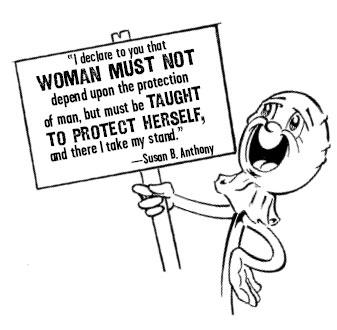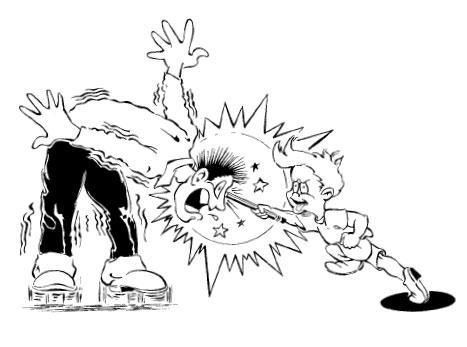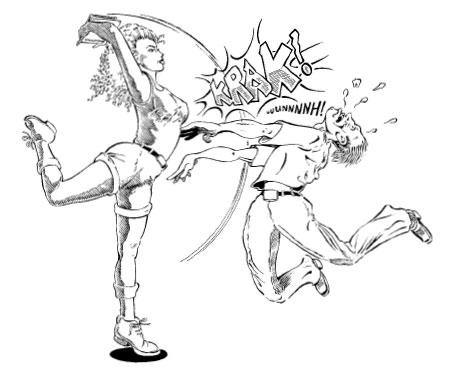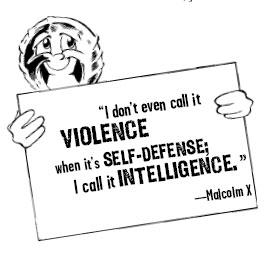When All Hell Breaks Loose (90 page)
Read When All Hell Breaks Loose Online
Authors: Cody Lundin
CODY:
So it sounds like, as with a lot of my training, that mind-set is everything and with the proper mind-set, you can take almost anything from your environment and use it to your advantage to help stay alive in a self-defense scenario.
PROFESSOR BRYANS:
Well put, Cody. Technique is always subservient to mind-set.
CODY:
As it's so critical, let's talk a bit more about mind-set. What exactly is a combat mind-set?
PROFESSOR BRYANS:
The
combat mind-set
, simply put, means that a person under attack is going to feel intense rage at the person coming after them and feel very natural in the process of going about destroying them. Really, a mind-set is simply a collection of beliefs pertaining to a certain area. So when you cultivate mind-set in your students, you're perhaps changing beliefs in certain areas about certain things, as I am with my students. There are several areas of belief that often need to be altered in a situation of self-defense. For example, sometimes a person firmly believes it's never right to injure another person under any circumstance. Or another belief that is often firmly embedded and gets in the way of a person defending himself is that he is not going to succeed and will only make matters worse if he fights back. Of course, in a self-defense situation these are totally irrational. Again, the combat mind-set is simply a belief structure that revolves around a combative situation. The proper response to someone trying to hurt you should be rage, anger, and action.

CODY:
So I think it's probably safe to say that every mother, if any harm were to be directed at her children, would have a natural combat mind-set.
PROFESSOR BRYANS:
You bet. I'll train women and often they'll say, "Oh, gosh, Mark, I don't know if I can do that attack technique or not." I then ask them what they would do if someone was going to hurt their son or daughter. Instantly their facial expression changes, they start to grit their teeth, and they'll often say something like, "I'd kill that son of a bitch!" I then remind them that they are just as important as their kid. Sometimes the combat mind-set is easier to apply to protect a loved one than to protect the individual herself. Again, we're back to altering belief structures—maybe their self-esteem just needs a little boost.
CODY:
In my field, a lot of survival training is bogus as it assumes the survivor will be a physically fit, twenty-four-year-old Special Forces soldier with a gung-ho mind-set. Is it the same for self-defense training? I mean, what about a typical home where there are going to be women, children, and maybe even grandparents living at the house? Can these people defend themselves?
PROFESSOR BRYANS:
Of course they can defend themselves, and, unfortunately, they're going to be the ones who are targeted, as predators will go after the weakest individuals that they feel they can easily victimize. Nothing really changes with these individuals other than it behooves them all to understand that they are in a deadly circumstance every time. They need to realize that they are fighting for their lives and that they must do the most decisive, destructive thing quickly. Weapons, or at the very least having something in the hand to strike with, will become more important. One of the things to keep in mind with these individuals is that they have a tremendous advantage with the element of surprise if they learn how to use it. No one would ever expect an elderly person to even fight back, let alone fight back effectively. So in a situation where the attacker is threatening, or the attack is mounting, a woman, elderly person, or child can fain compliance, go along with them, convince them that they aren't going to fight back, and thereby create an opening that might not exist for someone like you or me. In other words, the attacker might be less wary and open himself to being attacked with a quick chop to the throat, which would pave the way for more follow-up strikes.
CODY:
So family members don't need to feel out of place, they could even set up a counter-decoy for the more able-bodied family members to fight back. So there's a place in self-defense for each family member, is that what you're saying?
PROFESSOR BRYANS:
That's correct. When you look at actual incidences of self-defense, you'll note that the people who do successfully defend themselves usually are not martial artists or athletes. They are everyday women, children, and elderly people. The common denominator that I see, other than luck, over which we have no control, is that they all
take action
. Oftentimes women who fight back will defend themselves against rapists. Their mind-set is right and they are not about to be taken into that car or whatever. With this combative mind-set, their chances for success go way up, whether they fight back well or not, they should
just fight!


CODY:
As far as improvised weapons go, I guess Grandma could use her cane or whatever, right? Nothing changes concerning using improvised weapons with the elderly, kids, or women?
PROFESSOR BRYANS:
Correct, other than they are more justified in their use and won't have to fear any kind of legal repercussion if the situation is handled properly when the authorities show up.
CODY:
What about a smaller person needing to defend herself against a larger, more powerful attacker?
PROFESSOR BRYANS:
First off, keep in mind that people do it all the time. Smaller individuals defeat larger, stronger, more skilled individuals regularly. This isn't a sport; you're not in the ring; you're not squaring off with this individual. Remember that the attacker will have no idea that you are prepared and ready to launch a preemptive attack against him. When looking at a larger person, the smaller person needs to realize that you don't look at the strength of the individual. Look at his eye sockets. Are they any stronger than anyone else's? The throat, not much stronger than anyone else's; the testicles, same thing, and so forth. You have to look at the weak parts of the body, use the element of surprise, and destroy these targets.
Perhaps the single greatest advantage that the defender has is the element of surprise
.
CODY:
Are there any basic assumptions that one can make regarding an attacker?
PROFESSOR BRYANS:
Absolutely. You should always assume, regardless of your size or strength or ability, that your attacker will be stronger, bigger, more skilled, and faster and that he will be determined to fight to the death. Also, if you're doing everything that this chapter has outlined to avoid conflicts in the first place, there is a very good possibility that you're dealing with a psychopathic personality, a very dangerous individual who would be willing to do anything to you. It's not uncommon that somebody might kill a clerk when they steal a six-pack of beer from a store. Assume that you're dealing with a very, very dangerous adversary every time.
CODY:
What should people look for in an effective self-defense school and what kind of questions should they ask the instructor?
PROFESSOR BRYANS:
Look for a school that focuses entirely on self-defense, that there is no sporting aspect to what they're doing. It should also be self-defense in the extreme, in other words, worst-case-scenario situations. What if the attacker is highly motivated or high on drugs? If so, it's going to take a lot to stop that attacker. The school's curriculum should focus on offense, attacking the attacker, not on defensive responses of how to deal with an attack once it's already underway. In my school we teach counterattacks such as how to escape choke holds and bear hugs, and many other scenarios, but this is secondary to preemptive striking when attack is imminent. Ask the instructor if they spar, in other words, how the techniques are practiced, if they compete in sporting systems, and how long their classes last. You don't want anything to do with sparring, sports-type systems for self-defense. The school should teach ruthless, brutal, violent techniques—it's the only way to stop a violent attacker.
CODY:
So what if I drop an attacker? Will I be prosecuted for defending myself?

PROFESSOR BRYANS:
Well, first understand that this question can only be fully answered by an attorney. People should consult an attorney in their area about the laws of self-defense. Having said that, laws regarding self-defense differ from state to state. The place you would find the answer to these questions would be on the jury instructions for justifiable homicide. In the state of Arizona, for example, I can tell you that there are a number of things that are looked at—one of the biggest being what was the perception of the defenders at the time they defended themselves. Did they fear for their lives? Also, another thing that is commonly looked at is whether the defender had an escape option but did not take it. If you're ever in a situation where you have the time or the means to escape and you don't do so, you will never have a right to self-defense. It has to be unavoidable, unprovoked self-defense. Another factor in the state of Arizona is whether the defender provoked the self-defense situation in any way. If you get into an argument with somebody, and he pulls a knife and tries to stab you, you have a legitimate self-defense situation. But the legal courts may see it differently: if they decide that you provoked the situation, you will lose your right to self-defense. This all gets pretty complicated. Basically, go out of your way to stay out of trouble and not get into arguments—saying whatever needs to be said to appease the other person and only fighting when there is no other choice.